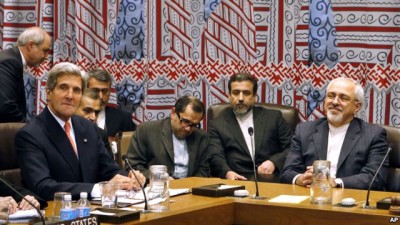Top US and Iranian Officials Meet to Thaw US-Iran Relations

The recent hopes of a possible political détente between the U.S. and Iran culminated in what some media outlets and observers are describing as a “breakthrough” meeting between the top diplomats from each country in New York City on Thursday night.
Following a multi-lateral discussion attended by representative from seven interested nations, U.S. Secretary of State John Kerry met with Iran’s Foreign Minister Mohammad Javad Zarif in a closed-door session designed to lay the groundwork for future talks surrounding the issue of Iran’s nuclear program.
The Iranians have repeated time and again that their nuclear program is designed solely for scientific and domestic energy production, but the U.S. continues to state, though it offers no conclusive evidence, that Iran maintains nuclear weapon aspiration.
According to foreign policy expert Phyllis Bennis, who wrote about U.S./Iran relations in the aftermath of speeches by President Obama and his counterpart Hossan Rouhani at the U.N. this week, if real progress is to be made in the diplomatic region, “more flexibility will be required than the United States is usually known for.”
However, reports that followed the meeting showed both Kerry and Zarif regarding the progress made as a promising and necessary step.
From The Guardian:
The meeting was chaired by the EU foreign policy chief, Catherine Ashton, who said that the parties would meet again in Geneva on 15 October for a two-day meeting aimed at achieving the first real diplomatic progress for several years. Zarif and Kerry said it was possible that the two of them would attend the Geneva meeting.
Ashton said she and Zarif both wanted a deal concluded in an ambitious timeframe and said an agreement could be implemented within a year.
“The discussions were very substantive, businesslike,” Zarif said, adding he hoped a solution could be found in a timely fashion.
Kerry noted a change in tone from Iran saying Zarif was “very different in the vision that he held out with respect to the possibilities for the future. I have just met with him now in a side meeting in which we took a moment to explore a little further the possibilities of how to proceed based on what President Obama laid out in his speech to the general assembly earlier this week,” Kerry said.
“And we’ve agreed to try to continue the process that will make concrete and find a way to answer the questions that people have about Iran’s nuclear program.”
And McClatchy adds:
The one-on-one talk was remarkable for its symbolism. It showed that both President Barack Obama and his newly elected Iranian counterpart, Hasan Rouhani, are prepared to risk considerable political capital in a diplomatic initiative that could encounter resistance at home and from some of their most important foreign allies. In the U.S. case that means Israel and Sunni Muslim Saudi Arabia and other Gulf Arab states who feel threatened by Shiite Iran’s nuclear program.
It also appeared to give weight to pledges by Rouhani, a Shiite Muslim cleric, before and after his unexpected election victory in June to seek a negotiated resolution to the nuclear dispute, win an end to the international sanctions that have devastated Iran’s economy and end its diplomatic isolation.
His charm offensive marked an abrupt turnaround from the combative and poisonous atmosphere that prevailed during talks between Iran and the world powers under Rouhani’s predecessor, Mahmoud Ahmadinejad.
But Kerry noted that an agreement is not certain and that the United States and its partners will demand that Iran account for the history of its program, including evidence that it researched nuclear weapons until at least late 2003.
“One meeting and a change in tone, which was welcome, doesn’t answer those questions yet. There is a lot of work to be done,” he said.
Lady Catherine Ashton, the European Union’s chief of foreign affairs, noted the “change in the dynamic.” And she recalled comments that Rouhani made to her earlier in the week that Iran would like to resolve the standoff within three months.
“The question is how far you can go in three months, or six months or 12 months, and 12 months is a good timeframe to think about some serious implementation on the ground,” she said.
According to Bennis, “It’s been too long coming, it’s still too hesitant, there’s still too much hinting about military force behind it… but we’re talking. Foreign minister to foreign minister, Kerry to Zarif, it’s all a good sign.”
___________________

